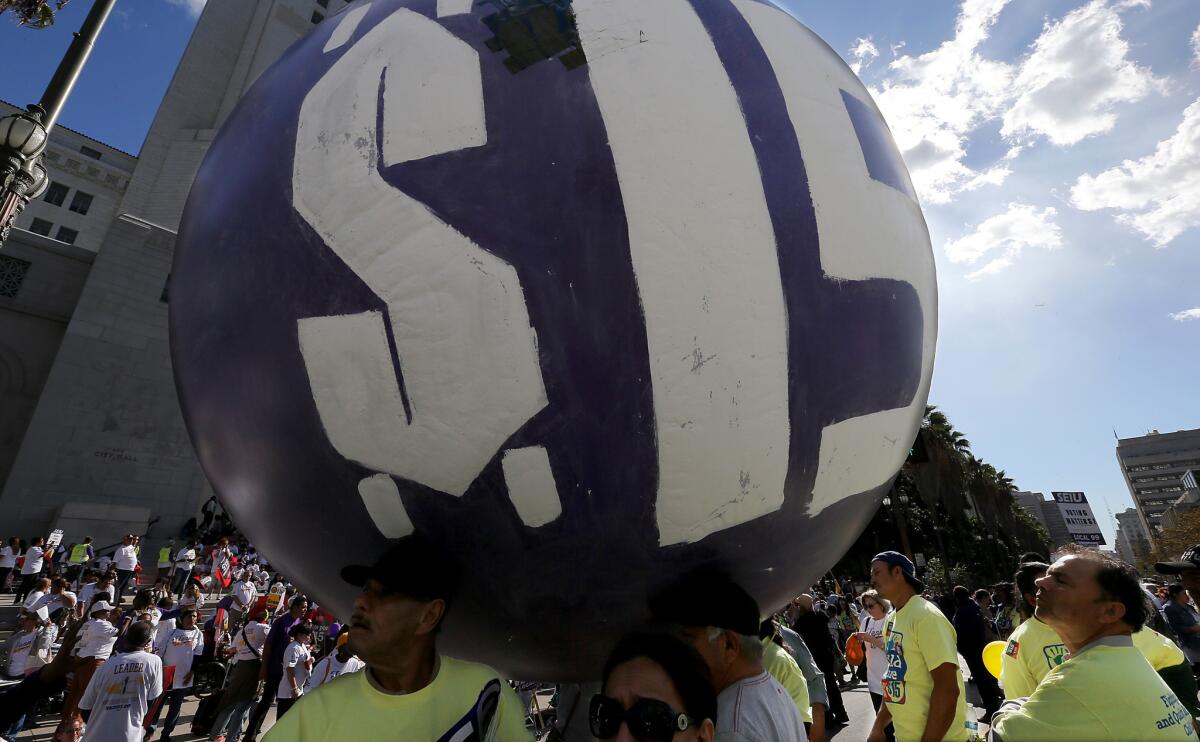Deal reached to boost California’s minimum wage to $15, avoiding ballot box battle

At a rally outside Los Angeles City Hall, workers press their demand for a minimum wage of $15 per hour.
- Share via
Reporting from Sacramento — Lawmakers and labor unions have struck a tentative deal to raise the statewide minimum wage to $10.50 an hour next year and then gradually to $15, averting a costly political campaign this fall and possibly putting California at the forefront of a national movement.
The deal was confirmed Saturday afternoon by sources close to the negotiations who would speak only on condition of anonymity until Gov. Jerry Brown makes a formal announcement as early as Monday.
The minimum wage compromise ends a long debate between the Democratic governor and some of the state’s most powerful labor unions. For Brown, it’s political pragmatism; numerous statewide polls have suggested voters would approve a minimum wage proposal — perhaps even a more sweeping version — if given the chance.
According to a document obtained by The Times, the negotiated deal would boost California’s statewide minimum wage from $10 an hour to $10.50 on Jan. 1, 2017, with a 50-cent increase in 2018 and then $1-per-year increases through 2022. Businesses with fewer than 25 employees would have an extra year to comply, delaying their workers receiving a $15 hourly wage until 2023.
Future statewide minimum wage increases would be linked to inflation, but a governor would have the power to temporarily block some of the initial increases in the event of an economic downturn.
A spokesperson for Brown did not immediately respond to a request for comment, nor did legislative leaders.
Brown, who signed a minimum wage increase in 2013, had resisted multiple efforts to revisit the issue at the legislative level until labor unions made it clear they were prepared to take the issue directly to voters. Last week, the first of two union-sponsored initiatives qualified for the Nov. 8 ballot. Its backers are hopeful that the final agreement will allow them to formally withdraw that initiative in a few weeks.
“We want to look at the details first,” said Steve Trossman of Service Employees International-United Healthcare Workers West.
Sources say the Legislature could vote on the wage compromise as soon as the end of next week by amending an existing bill on hold since 2015. Its passage would place California ahead of a minimum wage increase now being considered in New York, and would probably add fodder to the raucous presidential race. Both Sen. Bernie Sanders of Vermont and former Secretary of State Hillary Clinton have endorsed the goals of a nationwide campaign to raise wages to $15 an hour, and advocates say swift action in California could force both Democratic candidates to embrace what would be a more aggressive plan of action.
The proposal in Sacramento goes beyond private-sector hourly wages by including a gradual addition of up to three new paid sick days for government workers who provide in-home care to the disabled. The timing of those future benefits would be subject to economic conditions, but the proposal still represents a significant victory for labor groups.
In January, Brown warned of a $4-billion-a-year increase in state budget expenses if public-sector care workers — who are paid the minimum wage — were to receive $15 an hour. The gradual ramping up of wages and benefits in the new agreement is more aligned with Brown’s larger budget philosophy.
Though the agreement will affect millions of low-income workers starting in early 2017, it won’t affect efforts by some communities to boost local wages at a more rapid pace. One source described the statewide proposal as simply a “floor,” or base level, of wages upon which individual cities or regions can build if they choose.
Business groups, which did not immediately respond to requests for comment, were relegated to the sidelines during the negotiations. They had sought some kind of way to preempt the local wage ordinances through state legislation, but labor groups considered that kind of concession a non-starter.
Follow @johnmyers and @dillonliam on Twitter, sign up for our daily Essential Politics newsletter and listen to the weekly California Politics Podcast.
Times staff writer Melanie Mason contributed to this report.
ALSO:
Lawmakers forced to choose: Raise California’s minimum wage, or leave the issue to voters
How pay for the lowest wage earners has turned into a national fight
Cities want to raise the minimum wage. But it’s complicated
Santa Monica votes to raise its minimum wage
More to Read
Get the L.A. Times Politics newsletter
Deeply reported insights into legislation, politics and policy from Sacramento, Washington and beyond. In your inbox three times per week.
You may occasionally receive promotional content from the Los Angeles Times.












